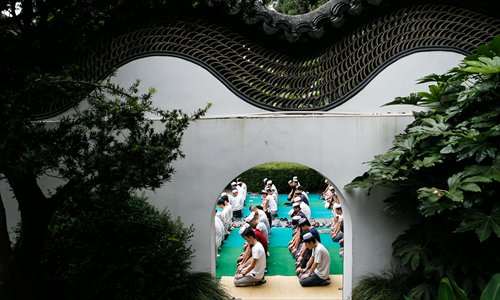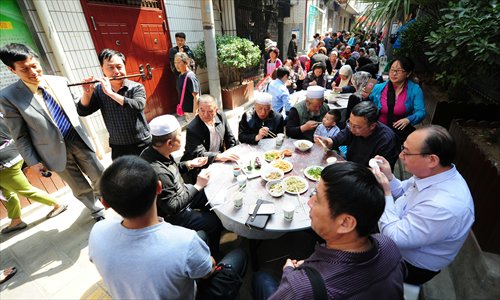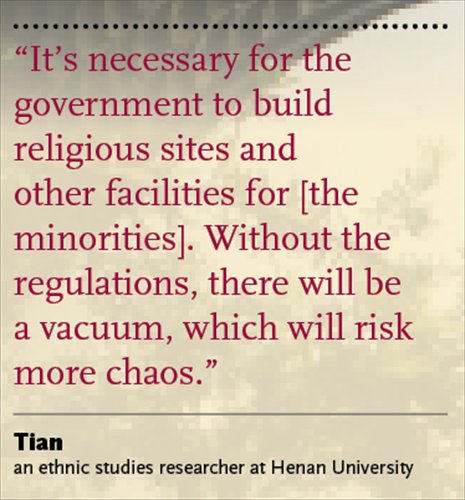A draft amendment triggers off worries about surge of Islamic extremism

Believers pray to mark the end of Ramadan in Shanghai's Songjiang Mosque on July 18, 2015. Photo: CFP
Editor's note:
China's social media has been abuzz with debates in the past week about a draft amendment which requires more governmental support for ethnic minorities living in urban areas. Controversial articles in the amendment concern halal food production and encouraging multi-ethnic communities.
Recently, a draft amendment concerning ethnic minorities issued by the Chinese government has drawn criticism as some worry that the draft might undermine the secular basis of the country's system.
On June 29, the Legislative Affairs Office of the State Council released a draft amendment to the Regulations on Work for Urban Ethnic Groups, to solicit public opinion.
Some believe a few of its provisions, which continue to offer financial support to halal food producers and traders and lay out plans to build a standard regulatory mechanism on halal food, combine the concepts of religion and ethnicity, and violate the country's secular principles.
Islam requires that food consumed by Muslims should be prepared according to certain procedures and therefore be "halal." In China there are reportedly 23 million Muslims, most of whom are Hui and Uyghur in China.
The range of favorable policies offered to ethnic minorities are increasingly controversial. The draft has driven the debate to a new high. Many people, including ethnicity studies experts and lawyers, have posted their opinions on social media. The topic has received 2.6 million views on Sina Weibo and more than 2,400 comments as of Wednesday.
Many Han have also claimed the amended version neglects their rights and interests, and equates ethnicity and religion which may intensify discrimination and inter-ethnic conflicts.
While some have argued that the regulations should be abolished, experts have said they are essential for social cohesion and stability at a time when worries over inter-ethnic relations are particularly high.

Han people dine with Muslims during a neighborhood festival in Xi'an, Shaanxi Province in 2016. Photo: CFP
Regulations
Most provisions remain the same in the latest draft, including giving preferential treatment to ethnic students in terms of funds and faculty allocation, and government support for enterprises engaged in producing, processing and selling products that are made for ethnic minorities through subsidized loans and tax reduction.
Some are new. However, one new provision that has been particularly controversial states that the government should tighten its management of halal food and establish a regulatory mechanism on halal food.
Xi Wuyi, an expert on Marxism at the Chinese Academy of Social Sciences, believed that the national legislation on halal food would run counter to the separation of religion and politics.
"So far, the national legislative and administrative bodies are still split over how to define halal food - whether it's the eating custom of Muslims or a food conforming to Islamic Sharia law," Xi lamented to the Global Times.
In April, China's legislative work plan for 2016 dropped its plan to draft a law on halal food after meeting controversy.
However, Ibrahim Ma Xiaozhi, a Muslim scholar from Northwest China's Gansu Province, believed the legislation of halal food is essential. "Some people overstate the negative side of the legislation. Without a regulatory system, the halal food related industry will be in chaos and it cannot win foreign recognition," Ibrahim told the Global Times.
He noted that the relationship between Han and other ethnicities is broadly friendly and the disputes are just single cases.
Halal food
Many non-Muslims are worried that Islam is becoming too prominent in Chinese public life. In May, some passengers complained that they were only offered halal food on their flight to Urumqi, capital of the Xinjiang Uyghur Autonomous Region. News reports recently showed a Beijing supermarket that banned customers from bringing non-halal food onto its premises.
"As a secular country, China should protect people's right to choose their food according to their customs. But in northwestern regions, some reverse phenomena have appeared. Some places have completely excluded non-halal food. In some places, the Muslims even beat non-halal food traders, or use religious force to suppress them," a Taiwanese, who declined to expose his identity, claimed in a long entry criticizing the regulations on his Weibo. While the veracity of the incidents that the netizen described has not been confirmed, they are an example of the kind of anxiety over inter-ethnic relations felt by many.
Financial subsidies offered to minority goods enterprises lead to some of these businesses gaining an unfair advantage, Xi argued.
A Weibo user named Ruoweijungu55, who claimed she is an atheist Hui from the Ningxia Hui Autonomous Region, said the government's financial support has promoted the over-use of the halal label and fake halal food. "Many enterprises are making use of the policy, putting 'halal' on their products simply to seek tax cuts," she said on her Weibo.
"Some producers don't actually operate strictly according to halal rituals. They have imams workings in their factories, but the cattle are slaughtered on assembly lines, and the halal chants are broadcast with a microphone," she cited.
In the 1990s when the supplies of processed food could not meet demand and manufacturing technology was relatively basic, it was reasonable to subsidize those enterprises, she claimed.
But as the economic situation has changed, these enterprises will still be viable without official support, the woman said.
"The largest beneficiaries of the policy is the entrepreneurs and the officials who are in charge of the approval for using the halal label, rather than the consumers," she claimed.
According to media reports, quite a few popular enterprises have applied for the halal label from regional Islamic associations, including the Guangdong-based Jiaduobao herbal tea.
Another provision in the new draft regards so-called "diversified communities," which states that the government will attempt to create more multi-ethnic communities with minorities "embedded" in Han-majority areas.
Wang Xiaodong, a political critic and Weibo celebrity with 1.7 million followers, expressed skepticism about the provision. "Does it mean that the government will forcibly embed ethnic minority groups into all communities, then they can arbitrarily beat us when they can't stand the flavor of our cooking?" he posted on his Weibo.
Tian, an ethnic studies researcher at Henan University, said multi-ethnic communities should form naturally, rather than being pushed together by the government.

Occasional disputes
What Wang was referring to is a case which occurred a few days ago.
On the evening of June 21, police officers in Tai'an, East China's Shandong Province, received a report from a barbecue shop owner surnamed Yin who accused his neighbor of damaging his shop after an argument.
The police later found that the neighbor, an ethnic Hui Muslim surnamed Li, objected to the smell of cooking pork coming from Yin's shop and asked him to remove it from his menu. Yin, an ethnic Han, refused and Li then vandalized the shop, according to local news portal taian.sdnews.com.cn.
According to the news portal, Li apologized for his impulsive actions; Yin apologized for failing to respect Li's eating habits, promised no longer roast pork and did not ask for compensation.
It's unclear whether the police made and enforced this resolution or if the two voluntarily reached this consensus. But many have described this case as "preferential treatment" offered to ethnic minorities and contrary to the rule of law.
Official figures show that there are 5.58 million residents of Tai'an, of which less than 1.5 percent are ethnic minorities.
As people move across the country and settle in China's rapidly expanding cities, more and more ethnic minorities are moving from villages into predominantly Han urban areas and living in multi-ethnic communities, explained Tian Ye.
"Take Wenzhou, a trade port in East China's Zhejiang Province, it had no Hui before. But as its trade with Arab countries has grown, its number of Hui residents has increased. It's necessary for the government to build religious sites and other facilities for them," Tian told the Global Times.
"Without the regulations, there will be a vacuum, which will risk more chaos," he said.
In November 1993, with the State Council's approval, the State Nationalities Affairs Commission promulgated the
Regulations on Work for Urban Ethnic Groups which give detailed provisions on how to guarantee the political, economic and cultural rights and interests of ethnic minorities living in Han-majority regions.
These rules built on previous policies including those which gave minorities bonus points in the national college entrance exams, a political representation quota and leniency in criminal proceedings. In 1984 the government announced the Two-Restraints-and-One-Leniency policy which requires law enforcement officers to exercise restraint when detaining minority suspects or criminals, and charge them leniently.
Hate speech
These kinds of concerns are not unique to China, and have in recent years spiked in the West also.
In the US, Donald Trump, the presumptive Republican presidential nominee who has advocated issuing a temporary ban on foreign Muslims entering the country, has received significant support.
In Europe, which has faced increasing immigration from the Middle East and North Africa amid regional instability, hate speech seems to be on the rise.
In early June, a Hui college student in Beijing posted an answer on his account on zhihu.com, a Chinese question and answer website, calling Han people "cowards" and saying that the pork they eat is "faeces." Some netizens gloated over a fire which broke out in a mosque in Wuzhong, Ningxia due to aging wiring in late June.
"The disputes and conflicts have been existing for a long time ... due to the development of social media, such cases simply seem to be more common," Tian said.
Tian, the ethnic studies expert, said in a bid to avoid disorder, the government sometimes favors minority communities. He claimed that in some places in Henan Province, minorities receive more compensation when their homes are demolished than their Han neighbors.
In recent years, more and more Han have called for an end to such favorable treatment. However, Yuandan Jacuo, an ethnic Tibetan and high school teacher in Xining, Northwest China's Qinghai Province, believes that preferential treatment should be expanded.
"The wealth gap keeps growing between eastern and western areas, where many ethnic minorities live. These areas' rich mineral and ecological resources have greatly contributed to the sustainable development of the economy in eastern regions, but the inhabitants of the west enjoy less benefits," Yuandan told the Global Times.
Newspaper headline: Testing tolerance